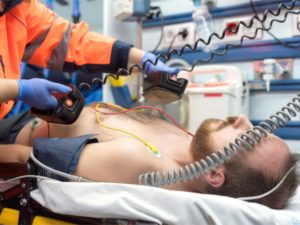What You Really Should Know about NJ’s Defibrillator Laws
Posted November 20th, 2018 by Anthony Carbone, PC.
Categories: Personal Injury.
 It’s a statistic that warrants a spotlight. According to the National Safety Council, defibrillators – also known as (AEDs) – could save 40,000 lives each and every year. No doubt it makes sense that the NJ Legislature actually has laws in place regarding these life-saving devices. More than likely, it’s not something you generally consider. However, NJ’s Defibrillator laws may be critical when it comes to saving your life – or that of a loved one.
It’s a statistic that warrants a spotlight. According to the National Safety Council, defibrillators – also known as (AEDs) – could save 40,000 lives each and every year. No doubt it makes sense that the NJ Legislature actually has laws in place regarding these life-saving devices. More than likely, it’s not something you generally consider. However, NJ’s Defibrillator laws may be critical when it comes to saving your life – or that of a loved one.
To begin with, you may not have any real understanding of how AEDs save lives. The American Heart Association provides some valuable insight into the devices. First, you should know that the acronym stands for Automated External Defibrillator. You may have witnessed AEDs in use as part of the storyline of a number of emergency medical shows on television.
What exactly do defibrillators do? During a cardiac arrest, they deliver an electric shock through the chest to the heart. As a result, an irregular heartbeat can be shocked into a normal one. A person who suffers sudden cardiac arrest – commonly referred to as a heart attack – may survive as a result.
Immunity from Civil Liability
Experienced personal injury law firms often provide information regarding prospective negligence cases. Unfortunately, many people worry that even their good deeds could trigger a lawsuit. Therefore, it’s essential for laypersons to understand they actually are protected by the New Jersey statutes when it comes to using an AED to save a life.
Notably, there are legal requirements when it comes to using a defibrillator as stated in NJSA 2A:62A-26. One obligation requires contacting emergency services for assistance. However, a lay person who fails to do so, in good faith – will be immune from civil liability if the victim suffers some personal injury as a result.
Immunity laws extend to others as well. In fact, NJSA 2A:62A-27 grants immunity to everyone from licensed physicians using AEDs – to other people or entities using and maintaining them. The bottom line is that the fear of a lawsuit should not be a deterrent when it comes to attempting to save a life.
Lawsuits Involving Defibrillators
The same laws allowing immunity from civil liability with regards to AEDs also have exceptions. More specifically, acts of gross negligence or wanton misconduct would not trigger immunity laws. For example, a person who knowingly uses a defibrillator to cause harm would not be protected by the law.
Understandably, access to defibrillators is a significant concern all on its own. There are laws that mandate the placement and maintenance of AEDs in these locations:
- United States government buildings
- New Jersey government buildings
- New Jersey school buildings
- Health clubs
- Nursing homes
- Public Recreational Facilities (including some Community Associations)
All things considered, the availability of a working AED may make all the difference in restoring a heartbeat. Unfortunately, such failures could result in life or death situations – all because an entity failed to provide or maintain the requisite device.
Contact Us
Have questions about NJ’s Defibrillator laws? Contact the Law Offices of Anthony Carbone if you have concerns that suggest a legal claim. There’s no cost to meet with us and we do not receive a fee unless we successfully assist you in securing monetary damages.


